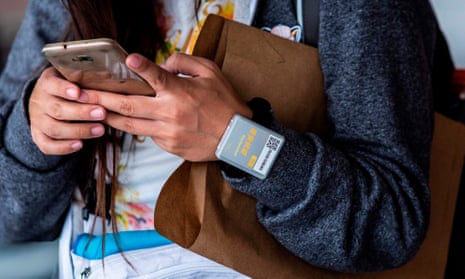Hong Kong will mandate electronic tracking bracelets for people in home isolation and bring in a China-style electronic health code system as part of fresh measures to curb the spread of the coronavirus.
The quarantine bracelets, to be introduced on Friday, will be mandatory for people who have tested positive and are quarantining at home to ensure they do not leave the building during their isolation period.
“We have to make sure that home isolation is more precise while being humane,” Lo Chung-mau, the city’s new health secretary said, announcing the new requirement on Monday. Breaching a mandatory quarantine order in Hong Kong carries a fine of up to HK$25,000 ($3,200) and up to six months in jail.
Hong Kong has previously used two types of bracelets to track people under home quarantine at the beginning of the pandemic in 2020: an earlier plastic wristband with a QR code and a later one with a bulky electronic tracker. Lo did not clarify which one would be introduced on Friday.
Under the health codes system, which tracks the movement of people via mobile phones, citizens will be allowed to enter public spaces if the QR code on their account is green. The code turns yellow if people have been in close contact with an infected person, and red if the person has tested positive for the virus.
Under the Hong Kong health code, arriving travellers will also be marked “yellow”, Lo said in his announcement.
People with red and yellow codes will not be allowed in “high-risk” venues such as hospitals and aged care facilities, and cannot engage in high risk activities, including taking off masks.
The new system will be rolled out in the “Leave Home Safe” app introduced last year at public spaces to track people’s movement.
Human rights watchdogs have criticised China’s health code system as an invasion of privacy, warning that Beijing uses data collected on the system to control and restrict freedoms.
Local experts warn Hong Kong’s health codes and bracelets may have the unintended consequence of swaying people to not report positive test results out of fear of major disruptions to their lives.
Although the measures may have a “marginal impact” on decreasing community spread, “the impact that is more concerning is the impact on testing and reporting,” Ben Cowling, chair professor of epidemiology at the University of Hong Kong’s School of Public Health, said.
Hong Kong is reporting an average of about 2,500 cases a day, but future statistics may not fully reflect the reality of the situation. “It may be in a week or two, it’s lower, not because transmission has gone down, but because people are not reporting,” Cowling said.
Hong Kong’s new measures signal the city is unlikely to relent on its bid to quash all Covid-19 transmission, even as other countries have continued to relax measures in light of higher vaccination rates as well as economic and social pressures.
“Most other parts of the world are going down the direction of not controlling transmission, but minimising severe cases,” Cowling said.
“That’s would what we would think of as an exit from the pandemic mode, but the introduction of these measures, if anything, is going in the other direction, back toward more stringent control, even though we have higher vaccine coverage, and availability of anti-viral drugs now.”
The new measures follow hopes the city may continue to ease restrictions, after the city put its Covid flight suspension mechanism on hold last Thursday. Hong Kong still maintains strict travel restrictions, imposing a seven-day hotel quarantine for arrivals, in line with China’s “zero-Covid” policy which aims to eradicate the virus in the community.
